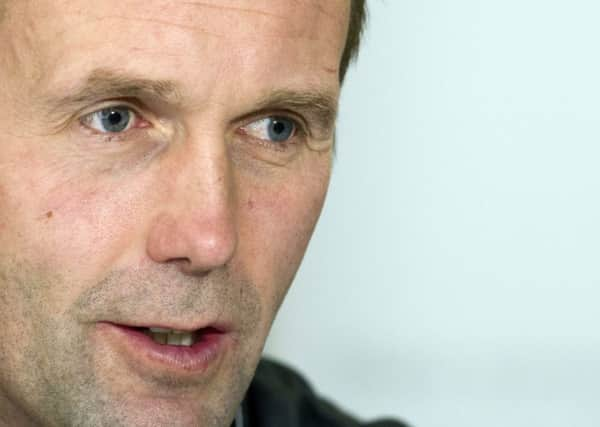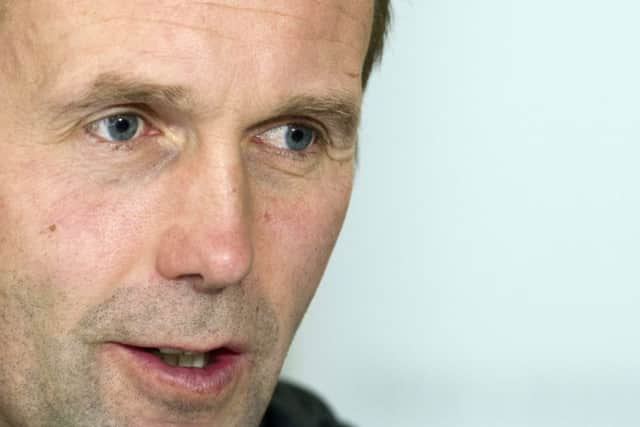Ronny Deila dismisses notion he is a ‘soft touch’


Tackle Deila on the topic of errant behaviour on and off the field from his players in the past couple of weeks and he offers revealing insights into his disciplinary methods, and those at the club. What these demonstrate is that the Celtic manager dares to believe that engaging players’ brains to create mutual respect is the only means by which you can lead them along the right path in the modern game.
It might sound New Age. It is certainly a world removed from the iron rod employed by old-school managers. Alex Ferguson employed the hair dryer. Deila would seem to prefer hypnotic, soothing wind-chimes, so far removed from the autocratic coach does he appear, and so little time does he have for the “hammer them if they step out of line” approach.
Advertisement
Hide AdAdvertisement
Hide AdNow, it might be argued, Deila’s strategy doesn’t exactly square with Anthony Stokes’ deserved red card for lashing out at an opponent – whatever the provocation – to produce a blemish at the close of the comprehensive Scottish Cup quarter-final replay win over Dundee United the other night. Likewise with the spat between James Forrest and John Guidetti over taking a penalty at the end of the League Cup win over United. Kris Commons described the playground antics as creating “not great scenes” that put a dampener on how the trophy was won and hardly suggested “the team ethic” was as powerful as those within the club promote. And then there was Scott Brown this week admitting to his “mistake” in having a night on the town four days before the cup final.


Deila was dismissive of any suggestion he could be perceived as a “soft touch”. It is “totally wrong” to arrive at that conclusion. He seeks “social intelligence”. Deila says he does have a temper but will not “attack” and fine footballers in fury.
“When things happen that I am not happy with, I talk with them about it,” he said. “What has been done, you cannot do anything about that. To punish them is not the right way. They have to understand themselves what they are doing and why they are doing things. Footballers are normal people. They don’t like to let people down and they know when they do it.
“The stupidest thing as a leader is to go after them and punish them. This kind of leadership has gone now – it should never be in football. To frighten people to get better, if others want to do that then do it, but I will never do it. They are grown-up people.
“We don’t have many instances but we play so many matches that, of course, we will have some things. We are under pressure 24 hours, we don’t have one minute off. If we go out the door we know that the media are there and supporters and I think it is good that there are not more instances.
“I get angry with a bad attitude, if you see people that give a sh** in the team but they don’t train well, put on weight and go drinking all the time, then I get irritated. I am never going to accept that. Everybody has to show that they want to get better, that they want to be part of the team.
“I can tell my kids that they can’t drink but they will do it, I promise you. I just have to be there when they have done it. What do you learn from that experience? What do you do next time? If they keep on making the same mistakes then we have to do something. I hope I won’t ever be in that situation.
“If they go beyond the rules we have they get fined. But they are fining themselves within the group and it is good that I am not a judge or something going round then trying to fine them. I am overseeing everything and if I see that there is this attitude that I think they are an individual in front of the team then I will go in and do something with it. But first I will talk with them and then we will see what we do. Once I see it is a bad habit, a bad culture, then I will take it on. I hardly give fines but it has happened. It has to be a big overstep.”
Advertisement
Hide AdAdvertisement
Hide AdStokes has certainly been an overstepper in the past. Yet Deila takes pride in what he sees as the Irishman’s personal development. “You saw in the League Cup final the best game I have seen from him so far since I’ve been at Celtic. In front of the players I said: ‘This is what you get when you are 100 per cent, when you work outside the pitch and on the pitch.’ I’ve dealt with so many players who have had issues. But players that stay totally still and show no improvement? That kills me inside. I can’t have them around me. That goes for staff, too.
“I’m not hard on mistakes. I remember Stokesy made a mistake in one of the first games, he lost the ball in midfield, the opponent counter attacked and we lost a goal. I took him after the game in front of the others and I said: ‘It was fantastic what you did. You worked hard and made penetrating runs.’ He looked at me as if: ‘What are you saying?’
“It was like he was sure I was going to talk about the bad pass, but bad passes will happen. The bad pass was a bad decision or a bad piece of skill, but you can’t frighten people to be better at passing. You have to teach that and you have to give the freedom for them to do it again.”
FOLLOW US
SCOTSMAN TABLET AND MOBILE APPS